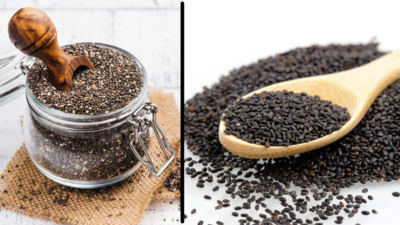- News
- lifestyle
- health-fitness
- diet
- Chia seeds vs Sabja: Health benefits and which one to consume in summer
Trending
Chia seeds vs Sabja: Health benefits and which one to consume in summer
Chia seeds and Sabja seeds (also known as basil seeds), two superfoods with distinct characteristics, offer various health benefits, especially during the summer months. Here is everything one should need to know about their differences, nutritional content, health benefits, and ultimately determine which is better suited for the hot months.

During summers staying cool and hydrated becomes a top priority. Adding certain superfoods to your diet can make a significant difference. Two such superfoods that have gained popularity are chia seeds and Sabja seeds (also known as basil seeds). Although they look similar and share some nutritional benefits, they have distinct characteristics and advantages, especially during the summer.Here is everything one should need to know about their differences, nutritional content, health benefits, and ultimately determine which is better suited for the hot months.
The appearance and their origins
Chia seeds, derived from the plant Salvia hispanica, originate from Central and Southern Mexico and Guatemala. They are small, oval, and come in a mix of black, white, and grey colours. On the other hand, Sabja seeds, harvested from the sweet basil plant (Ocimum basilicum), are uniformly jet black and round in shape, primarily sourced from India and Southeast Asia.
What are the nutritional content of Chia seeds and Sabja
Chia seeds: Chia seeds are full of nutrients. Per 100 grams, they contain:
- Calories: 58 kcal
- Protein: 2 g
- Carbohydrates: 5 g
- Fiber: 4 g
- Fat: 3.8 g (including omega-3 fatty acids)
- Calcium: 76 mg (6% of daily recommended intake)
- Iron: 1 mg (6% of daily recommended intake)
- Magnesium: 40 mg (10% of daily recommended intake)
- Phosphorus: 860 mg

Image: Canva
Chia seeds are also rich in antioxidants, vitamins (B1, B2, B3, E, and C), and minerals such as potassium, zinc, and manganese.
Sabja seeds: In contrast, sabja seeds per tablespoon (about 13 grams) offer:
- Calories: 57 kcal
- Protein: 2 g
- Carbohydrates: 7 g
- Fat: 2.5 g (including omega-3 fatty acids)
- Calcium: 15% of daily intake
- Iron: 10% of daily intake
- Magnesium: 10% of daily intake
Sabja seeds are also packed with polyphenols and flavonoids, contributing to their antioxidant properties.
What are their health benefits
Chia seeds are celebrated for their numerous health benefits, including:
- They can absorb up to 12 times their weight in water, helping to keep the body hydrated.
- High fibre content supports digestive health and helps in weight management.
- Omega-3 fatty acids reduce inflammation and support cardiovascular health.
- Chia seeds help stabilise blood sugar levels, providing sustained energy and endurance.
Sabja seeds, known for their cooling properties, offer the following benefits:
- Excellent for reducing body heat, making them ideal for summer.
- Helps relieve constipation and acidity
- Beneficial for diabetic patients by lowering blood sugar levels.
- Promotes a feeling of fullness, reducing appetite and aiding in weight loss.
- Like chia seeds, they absorb water and help keep the body hydrated.
How to consume them for better nutrition
Chia seeds can be consumed in various ways:
- They can be eaten raw, added to water or juices, or soaked to form a gel-like consistency.
- Blend into smoothies or make chia pudding with milk.
- Add them to bread, muffins, or as an egg substitute in vegan recipes.

Image: Canva
Sabja seeds are typically soaked before consumption:
- Added to lemonades, juices, and smoothies for a refreshing drink.
- Used in traditional desserts like falooda.
- Sprinkle on top of salads or curd for added texture.
Which one is better for summer
While both chia and sabja seeds offer various health benefits, sabja seeds have a slight edge when it comes to cooling properties and hydration, making them particularly suitable for the summer heat. Their ability to naturally reduce body temperature and provide quick hydration makes them a preferred choice during the hot months.
Chia seeds are also highly beneficial and versatile, offering extensive nutritional benefits and ease of use. Including both in your diet can provide a balanced variety of nutrients and health advantages.
Simple lifestyle changes to avoid kidney stones
End of Article
FOLLOW US ON SOCIAL MEDIA










